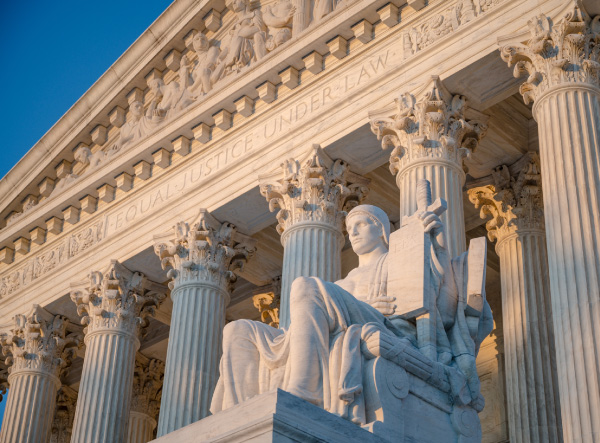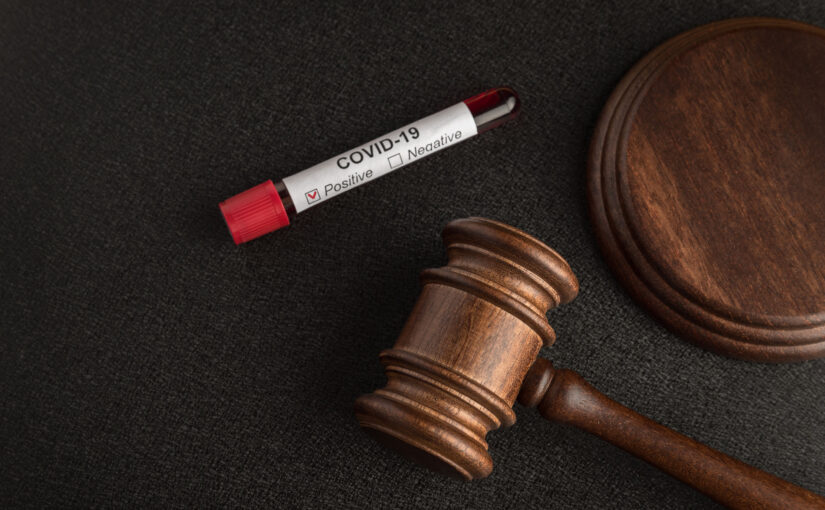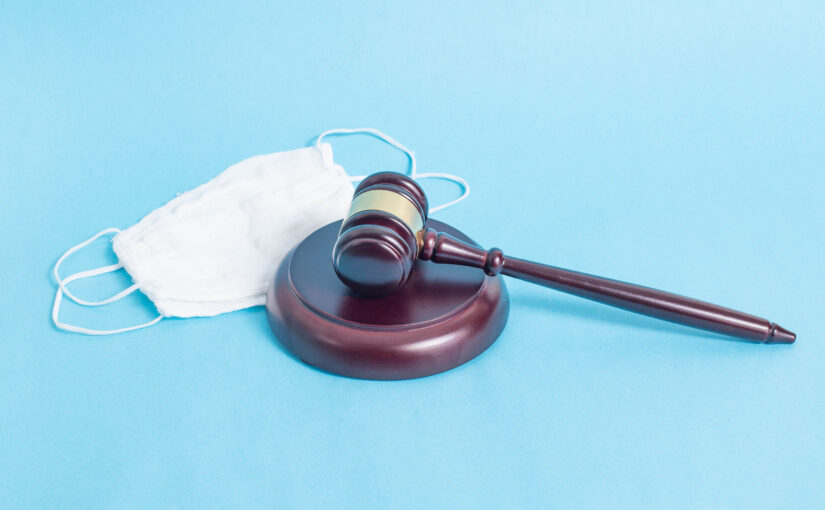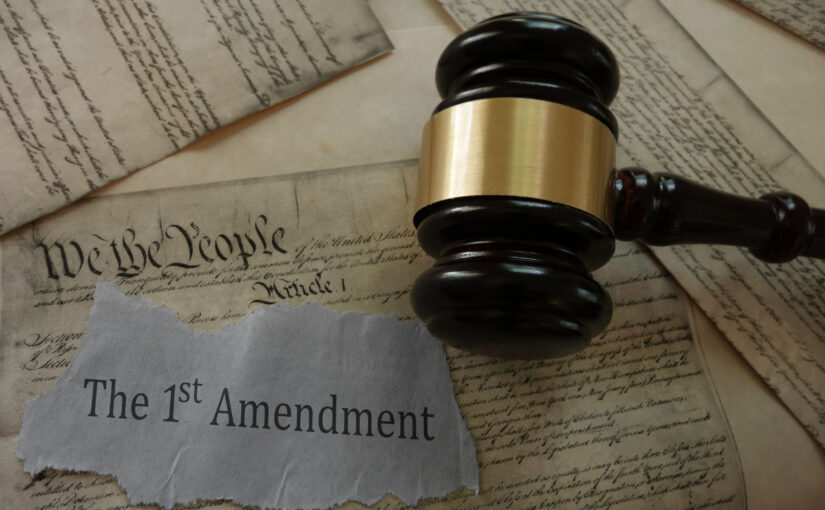Foley, Baron, Metzger & Juip is committed to helping our clients through the challenges they face during the COVID-19 pandemic. To that end, please explore the legal insights and resources below for assistance in navigating the myriad issues, from executive orders to court decisions, that have arisen during the crisis.
January 2022

Pharmacist Attorney Kim Sveska Publishes Article for MPA Journal – “PREP Act: What You Need To Know And What It Means For Prescribing”
FBMJ pharmacist attorney, Kim Sveska, recently published the article “PREP Act: What You Need To Know And What It Means For Prescribing” in the Michigan Pharmacist Journal (2022 Vol. 60 Issue 1), a publication of the Michigan Pharmacists Association (MPA). The article discusses the PREP Act and how it relates
January 2022

SCOTUS Strikes Down One Vaccine Mandate, Upholds Another
On January 13, the Supreme Court of the United States (SCOTUS) struck down the Biden Administration’s vaccine mandate that was to apply to all large employers. That same day, the Supreme Court upheld the administration’s vaccine mandate that applies to healthcare workers at healthcare facilities that receive Medicare and Medicaid. These
January 2022

FBMJ Attorneys Co-Author Medscape Article – 7 Legal Risks of Promoting Unproven COVID Treatments
FBMJ attorneys Julie Janeway and Brian Whitelaw co-authored, “7 Legal Risks of Promoting Unproven COVID Treatments,” published by Medscape on December 6, 2021. The article cautions healthcare providers of the risks of promoting unproven products, preventives, treatments and cures when treating patients with COVID-19. The article discusses the consequences from state medical
April 2021

FBMJ Attorneys Featured Presenters at MSHRM Event
FBMJ attorneys, Saulius Polteraitis and Carlos Escurel, recently presented “Covid Liability and Impact Medical Malpractice Claims” to the Michigan Society of Healthcare Risk Managers (MSHRM) as part of its Webinar series. They were joined by Mike Severyn of ProAssurance on the panel. The presentation covered the anticipated landscape of malpractice claims
January 2021

Michigan Private Schools’ Motion to Enjoin COVID Regs Denied as Moot; School Seeking to Join Lawsuit as Plaintiff as Case Proceeds
A Michigan federal court judge denied a group of parents and nonpublic schools’ request for a preliminary injunction that sought to enjoin COVID-19 restrictions the state implemented in November that precluded the school from hosting in-person classes. The one-page opinion from Judge Paul Maloney said the motion was rendered moot
December 2020

Michigan Religious Schools: Michigan COVID Regs Violate First Amendment
A group of nonpublic schools has filed suit in Michigan federal court alleging that the state’s Health and Human Services directive that schools remain closed through December 20 violates the First Amendment. The lawsuit was filed on December 7 by the Michigan Association of Nonpublic Schools (MANS), which has since
December 2020

U.S. Supreme Court Invalidates COVID Restrictions on Religious Exercise
Just months after the U.S. Supreme Court declined to hear a California religious group’s challenge to COVID-19 restrictions on group worship, the Court blocked such restrictions on religious organizations in New York. The decision, by a 5-4 vote, confirms that the closely divided court has become somewhat unpredictable as to
December 2020

Michigan Gov. Signs Law Giving Healthcare Facilities Liability Protections
On October 22, 2020, Governor Whitmer signed into law House Bill 6159, creating a Pandemic Health Care Immunity Act to protect health care workers against liability for claims arising out of care provided in response to the COVID-19 pandemic. This law was part of a package of COVID-related bills signed
September 2020

Attorney Anthony Pignotti Authors Article on COVID-19 Executive and Administrative Orders and Their Impact on the Legal System for MDTC Quarterly
FBMJ attorney Anthony Pignotti authored “Summary and Analysis of Executive and Administrative Orders Issued in Response to the COVID-19 Pandemic and Their Impact on the Legal System” for the September 2020 issue of Michigan Defense Quarterly Volume 37, No. 1 – 2020. The article addresses how COVID-19-related executive and administrative orders
July 2020

Gov. Whitmer Extends Remote Notarization Provisions Through August 31, 2020
Remote notarizations will continue to be permitted through August 31, 2020 under a new order Gov. Whitmer issued this week. Executive Order 2020-158 extended a previous order encouraging the use of electronic signatures and remote witnessing of signatures due to COVID-19 and suspending in-person notarization and signing requirements. NOTARIZATION As with the
July 2020

Michigan State of Emergency Extends Into July: Here’s What Litigants Need to Know
Many of the more than 160 Executive Orders and Administrative Orders Gov. Whitmer and the Michigan Supreme Court have issued in response to the COVID-19 pandemic impact the legal system, the litigants, and their insurers. Below is a brief review of how these orders change important civil litigation deadlines ranging
June 2020

More Businesses Allowed to Open But Must Be Compliant
The start of June brings further relaxed restrictions in the State of Michigan as the Governor announced an end to the Stay at Home orders applicable to most Michigan businesses. This is the Governor’s recognition of the State’s overall improvement in combatting COVID-19, correlating with improved tracing efforts, health system
June 2020

Free Webinar: Are you Ready? COVID-19 Infectious Disease Plans & Michigan Law
As businesses across Michigan take steps to reopen after the COVID-19 shutdown, they must consider a range of issues in order to make their workplaces safe and comply with various rules and regulations. On Wednesday, June 10 at 11 a.m. ET, Foley Baron, Metzger & Juip attorneys Ben Fruchey and Nick
June 2020

Executive Order 2020-104 Authorizes Pharmacists, Physician Assistants, and Nurse Practitioners to Establish and Administer COVID-19 Testing Services With Proper Safety Protocols in Place
Governor Whitmer’s Executive Order (EO 2020-104, the “Order”) aims to help prevent the further spread of COVID-19 by enabling additional types of qualified medical professionals to order and administer COVID-19 tests. The Order encourages the establishment of community testing locations by reducing barriers to siting and staffing such test sites.
May 2020

Federal Courts Issue Rulings on 1st Amendment Rights During COVID-19
Most state governments have responded to COVID-19 with executive orders and laws that restrict the public from certain activities, including religious assembly. Such limitations on activities protected by the First Amendment have resulted in a flurry of lawsuits – at least one that reached the Supreme Court – alleging First
May 2020

Executive Order 2020-86 Relaxes Restriction on Telemedicine for Physicians Certifying Medical Marihuana Patients
The ill effects of the COVID-19 pandemic have touched all aspects of American commerce, and the doctor-patient relationship is no exception. Immuno-compromised patients, those with pre-existing conditions, and even the healthy are forgoing doctor visits of all kinds, likely out of fear of contracting the virus. In the first three
May 2020

Executive Order 2020-97 Requires Michigan Companies to Develop a COVID-19 Infectious Disease Plan by June 1, 2020, Or Within Two Weeks of Resuming In-Person Work
Governor Whitmer has built upon prior executive orders and clarified the process for returning to “in-person” work in Michigan via Executive Order 2020-97 (the “Order,” available here). The Order requires that by the later of June 1, 2020, or within two weeks of resuming in-person work, any company operating in
May 2020

Executive Order 2020-77 Emphasizes the State’s Requirement for COVID-19 Specific Preparedness Plan to Protect In-Person Workers
It should now be clear to business owners that a return to in-person work will require employers in Michigan, as well as much of the rest of the country, to implement a COVID-19 preparedness and response plan prior to workers returning to in-person work. These plans are mandated regardless of
April 2020

Governor Whitmer Mandates Employers Develop COVID-19 Preparedness Plans To Perform “In-Person” Work
On April 24, 2020, Governor Gretchen Whitmer issued Executive Order 2020-59 (the “Order”), which extends the Stay-at-Home timeframe to May 15, 2020, and expands the universe of workers allowed to return to work outside the home. Key to the Order is the requirement that businesses with any employees working in-person
April 2020

Governor Whitmer’s New Stay-At-Home Order (Executive Order 2020-42) Has Legal Requirements for Business Owners to Fulfill Before Starting In-Person Operations
In addition to the Stay-at-Home provisions and exceptions in Governor Whitmer’s Executive Order 2020-42 which are outlined below, the Order requires business owners to address three legal requirements to conduct in-person operations. These are: (1) Preparation of a COVID-19 Preparedness and Response Plan consistent with OSHA guidance; (2) determine who,
March 2020

Executive Order 2020-21 (COVID-19) – What the Stay at Home Order Means for Michigan Citizens and Businesses
On March 23, 2020, Governor Whitmer issued a “stay-at-home” order titled Executive Order 2020-21 (“EO 2020-21”). The stated purpose of the Order is to assist in slowing the spread of novel Coronavirus COVID-19 and to protect the healthcare system from being overwhelmed. This article provides an overview of the Order
March 2020

Maintaining MIOSHA Compliance in the Rapidly Changing COVID-19 Environment
As the COVID-19 pandemic unfolds, business owners, managers and executives may be wondering: 1. What are the employer’s responsibilities to keep employees safe from COVID-19? 2. Do I need to report to MIOSHA that an employee has been diagnosed with COVID-19? In this article, we address these questions with a focus on helping
March 2020

Michigan Supreme Court Issues Administrative Orders Affecting Courts and Cases During the COVID-19 Crisis
The Michigan Supreme Court has issued several Administrative Orders since the outbreak of the COVID-19 crisis which impact the operations and procedures of courts and court cases across the State of Michigan. Administrative Order No. 2020-2: Limiting Activities/Assemblages in Michigan Courts On March 18, the Michigan Supreme Court (the “Court”) issued Administrative
March 2020

Essential Issues for Landlords to Consider in Response to COVID-19
The COVID-19 pandemic is affecting businesses across all sectors of the economy, and landlords are no exception. The most obvious challenge landlords face is the inability of tenants to pay rent due to the economic downturn, but there are other important issues that landlords must address related to their commercial
March 2020

FBMJ Takes Steps to Combat the COVID-19 Outbreak While Ensuring Continuity of Service
The COVID-19 crisis is impacting all of us in myriad ways. At Foley, Baron, Metzger & Juip, we are committed to helping our clients navigate through the challenges they are facing during these uncertain times. We are also taking steps to protect the safety of our attorneys and staff, as
Foley, Baron, Metzger & Juip is here to help you evaluate and overcome the potential business, legal, and/or regulatory impact of COVID-19. For assistance, please contact us to discuss your legal needs.

